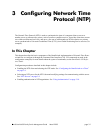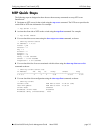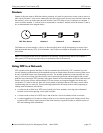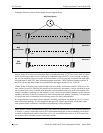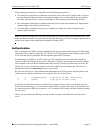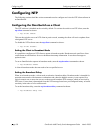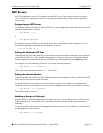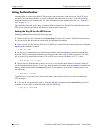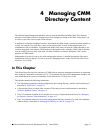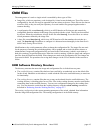
Configuring NTP Configuring Network Time Protocol (NTP)
page 3-8 OmniSwitch 6600 Family Switch Management Guide March 2005
Configuring NTP
The following sections detail the various commands used to configure and view the NTP client software in
an OmniSwitch.
Configuring the OmniSwitch as a Client
The NTP software is disabled on the switch by default. To activate the switch as an NTP client, enter the
ntp client command as shown:
-> ntp client enable
This sets the switch to act as an NTP client in passive mode, meaning the client will receive updates from
a designated NTP server.
To disable the NTP software enter the ntp client command as shown:
-> ntp client disable
Setting the Client to Broadcast Mode
It is possible to configure an NTP client to operate in broadcast mode. Broadcast mode specifies a client
switch listens on all interfaces for server broadcast timestamp information. It uses these messages to
update its time.
To set an OmniSwitch to operate in broadcast mode, enter the ntp broadcast command as shown:
-> ntp broadcast enable
A client in broadcast mode does not need to have a specified server.
Setting the Broadcast Delay
When set to broadcast mode, a client needs to advertise a broadcast delay. Broadcast mode is intended for
operation on networks with numerous workstations and where the highest accuracy is not required. In a
typical scenario one or more time servers on the network broadcast NTP messages which are received by
NTP hosts. Correct time is determined from this NTP message based on a pre-configured latency or broad-
cast delay in the order of a few milliseconds.
To set the broadcast delay, enter the ntp broadcast-delay command as shown:
-> ntp broadcast delay 1000




